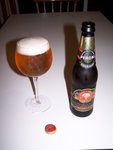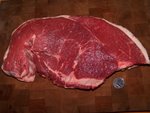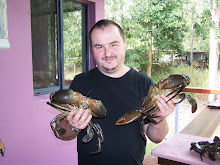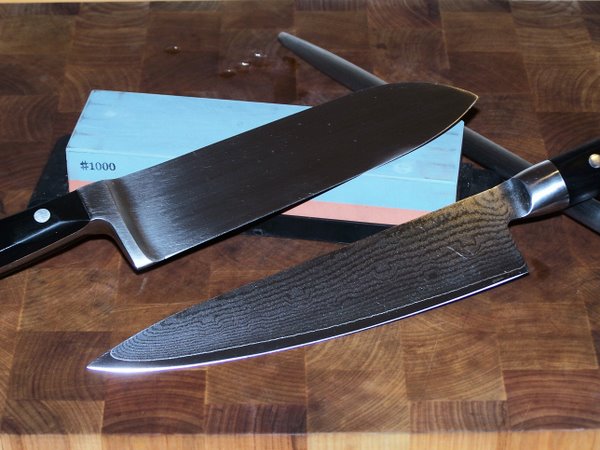The average home brew kit calls for a can of malt hop extract and sugar. But with the addition of a few cheap ingredents you can go from:
"It's not great beer, but it gets me pissed so I'll drink it". To...
"Shit mate, this is one of the best beers I've ever tasted"!

1 tin of Cascade Spicey Ghost draught malt hop extract. $13.50
1kg of light dry malt extract. $7.50
2X 250g bags of roasted cracked wheet or barly grain malt. 2X $2.50
15g cryo sealed bag of cascade dryed hop pellets. $2.50
Total cost = $28.50AU
Note: The hop plant is closely related to cannabis. (Hops stink like pot). When hop pellets are used to make beer it smells like 50 pounds of hydro are being baged up for distribution. So open a window and turn on the extrator fan if this aroma offends the pellet.
 To make the 'wort' (This is the term given to unfermented beer).
To make the 'wort' (This is the term given to unfermented beer). In a large stainless, (copper if you can afford it) pot bring 2lt of the best freshest water you can get your hands on to the boil. Add half (7g) of the hops, the grain, and the dry malt to the water. Reduce to a very slow simmer and let cook/steep for about 2 hours stiring occationally. After this time add the rest of the hops. Splitting the hops works like this:
When you boil hops for an hour or more the floral fragrence disapates leaveing the bitter tannins that contribute to the flavor profile. Boiling for less than an hour means that the bitter tannins don't have a chance to infuse but floral flavors and aromas can impart themself.
In a seperate pot immerse the can of malt hops in water just off the boil, about 90C is good. let stand for 30 minutes. Now remove the can from the pot. Carefully open it and add the contents to the simmering hop malt grain mixture. Make sure as much of the cans contents as possible is added. You may wish to rince the can with a bit of boiling water to get at the last dregs. Bring the water in the pot that the can was in to the boil and chuck a strainer in. The strainer is needed in a minute to remove the bits from the wort. Boiling it will make sure it's sterile, a must when makeing beer.
Now place the strainer over the top of your sterile and pre rinsed fermenter. Pour the wort consentrate through the strainer so as to sepperate the grain and hops. Now rince, or sparge as it's known in beer makeing jibe the grain and hops that were caught in the strainer. To do this just run some water through the strainer untill it runs more or less clear. This will wash out the last and best of the flavors into the wort. Remove the strainer, top up to the desired level with water. The quality of the water used in makeing beer is very important, fresh soft spring water is best. If you cant get that just use the best water you've got. Don't be fooled into thinking that the flavor of the beer will hide the taste of bad water, it won't, it will taste even worse. Add yeast. Seal the fermenter and let the magic fermentation happen.
If all goes well, at 25C the wort will have transformed into beer after about 8 days. Bottle your beer according to normal sterile conditions. To prime your bottles, (add sugars to aid in carbonation) I prefer to use raw sugar.
With about 3 or 4 months of bottle conditioning you can marvel at the stunning improvement in your brewing skills. All thanks to the added goodness of grains and hops. Note the complicated floral nose, the supurb mouth feel, the hop malt counter balance, fine beading, and sustained head.
And it gets you sloshed.

It's getting into winter at my place, I love winter, it's not hot for a change. Winter brings heaps of yummy things to my table. One of my favourites is mushrooms. This time of year when it finally rains mushrooms seem to spring up over night. The above picture is of several local varieties. Don't ask for names coz I got no f'n clue. All I know is they taste great, and nobody tripped out.




















